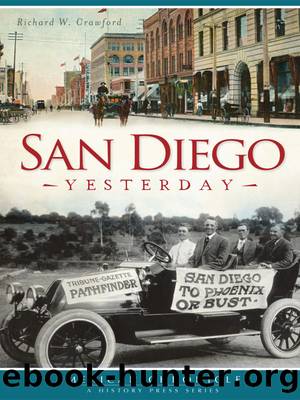San Diego Yesterday by Richard W. Crawford

Author:Richard W. Crawford [Crawford, Richard W.]
Language: eng
Format: epub
Publisher: The History Press
Published: 2013-03-24T07:00:00+00:00
Border Baron Frank “Booze” Beyer (center) visiting the racetrack at Tijuana. From San Diego Magazine, September 1967.
The cornerstone property for the Beyer and his fellow “vice-concessionaires” would be the Owl, but their interests also included casinos in the Mexican border towns of Tijuana and Algodones. In Tijuana, the ABW realm controlled the gambling clubs of Monte Carlo, the Tivoli Bar, the Foreign Club and horse racing at the Jockey Club.
In Mexicali, the Owl drew a large share of the American tourists who crossed the border each day in the 1910s. With roulette wheels and nearly forty tables for keno, faro and poker, the casino billed itself as “the largest gambling house on the American continent.” Liquor was served by ten bartenders at “the longest bar in the world.” The Owl also housed the largest brothel on the border, with rooms for more than one hundred prostitutes. Beyer and his partners crafted a slogan to remind tourists that they were open 24/7: “Both night and day, across the way, you will never find closed, the Owl Café.”
But despite profitable success for most of a decade, the Owl did close in 1922 after a severe fire. Rebuilt, it reopened for a time as the ABW Club. But the death of partner Carl Withington in 1925 began the decline of the syndicate’s firm control over vice in Mexicali and Tijuana. New border barons such as James “Sunny Jim” Coffroth and Baron Long moved in to dominate gaming in Tijuana.
In the meantime, Frank Beyer had growing interests closer to his new home in San Ysidro, where he and his wife, Blanche, settled in 1918. In the 1920s, the Beyers ran a jewelry and pawnshop in town. They bought ranch property, bred horses and raised Guernsey cows on a dairy farm Beyer called Rancho Lechuza.
San Ysidro was, of course, conveniently close to Beyer’s business activities in Tijuana. Known to all as “Booze” Beyer, he was a fixture at the racetrack, where he was usually seen in a rumpled gray suit with a black hat crumpled under his arm. He was a skilled card player. Hollywood celebrities were known to drive to Tijuana to play high-stakes faro with Beyer. Evenings were spent at the nearby Sunset Inn—another ABW property—where the music-loving Beyer tipped the orchestra two dollars after every set.
While he kept an attentive eye on his Tijuana gambling interests, Beyer also began to show a public interest in philanthropy. In May 1924, the County of San Diego was surprised to hear that “Booze” Beyer and his wife wanted to donate $7,000 to San Ysidro for a community library. Beyer promised to build and furnish the library and establish a ten-year trust fund to buy books and magazines.
The county gratefully accepted the gift and agreed to honor a few provisos from Beyer. “The conditions,” reported the county librarian, “are that his name will be on the building…that it shall have a smoking room and he wants it understood from the start that there is to be no gambling in the building.
Download
This site does not store any files on its server. We only index and link to content provided by other sites. Please contact the content providers to delete copyright contents if any and email us, we'll remove relevant links or contents immediately.
| Bridges | Cities |
| Houses & Hotels | Lighthouses |
| Monuments |
Shoot Sexy by Ryan Armbrust(17134)
Portrait Mastery in Black & White: Learn the Signature Style of a Legendary Photographer by Tim Kelly(16479)
Adobe Camera Raw For Digital Photographers Only by Rob Sheppard(16381)
Photographically Speaking: A Deeper Look at Creating Stronger Images (Eva Spring's Library) by David duChemin(16153)
Bombshells: Glamour Girls of a Lifetime by Sullivan Steve(13102)
Art Nude Photography Explained: How to Photograph and Understand Great Art Nude Images by Simon Walden(12340)
Perfect Rhythm by Jae(4617)
Pillow Thoughts by Courtney Peppernell(3384)
The Book of Joy by Dalai Lama(3212)
Good by S. Walden(2910)
The Pixar Touch by David A. Price(2737)
Fantastic Beasts: The Crimes of Grindelwald by J. K. Rowling(2540)
A Dictionary of Sociology by Unknown(2516)
Humans of New York by Brandon Stanton(2376)
Read This If You Want to Take Great Photographs by Carroll Henry(2299)
Stacked Decks by The Rotenberg Collection(2267)
On Photography by Susan Sontag(2128)
Photographic Guide to the Birds of Indonesia by Strange Morten;(2086)
Insomniac City by Bill Hayes(2080)
